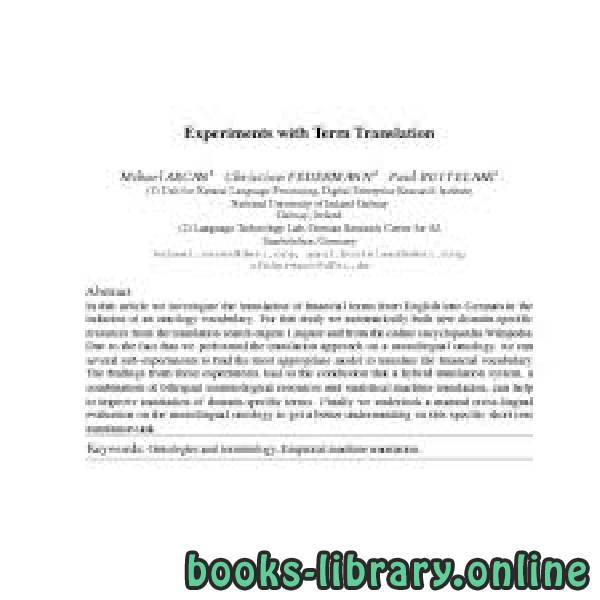📘 قراءة كتاب Experiments with Term Translation أونلاين


هذا القسم يحتوى علي كل ما يخص الترجمة وعلومها
التَّرْجَمَة أو النَّقْل هي عملية تحويل نص أصلي مكتوب (ويسمى النص المصدر) من اللغة المصدر إلى نص مكتوب (النص الهدف) في اللغة الأخرى. فتعد الترجمة نقل للحضارة والثقافة والفكر.
تنقسم الترجمة إلى ترجمة كتابية وتحريرية ونصية وترجمة فورية وشفوية وسماعية.
لا تكون الترجمة في الأساس مجرد نقل كل كلمة بما يقابلها في اللغة الهدف ولكن نقل لقواعد اللغة التي توصل المعلومة ونقل للمعلومة ذاتها ونقل لفكر الكاتب وثقافته وأسلوبه أيضاً، لكن اختلفت النظريات في الترجمة على كيف تنقل هذه المعلومات من المصدر إلى الهدف، فوصف جورج ستاينر نظرية ثالوث الترجمة: الحرفية (أو الكلمة بالكلمة) والحرة (الدلالة بالدلالة) والترجمة الأمينة.
وتعتبر الترجمة فناً مستقلاً بذاته حيث أنه يعتمد على الإبداع والحس اللغوي والقدرة على تقريب الثقافات وهو يمكن جميع البشرية من التواصل والاستفادة من خبرات بعضهم البعض. فهي فن قديم قدم الأدب المكتوب. فقد تم ترجمة أجزاء من ملحمة جلجامش السومرية، من بين أقدم الأعمال الأدبية المعروفة، إلى عدة لغات آسيوية منذ الألفية الثانية قبل الميلاد.
ومع ظهور الحواسب، جرت محاولات لاستخدام الحاسوب أو ترجمة النصوص من اللغة الطبيعية بالترجمة الآلية أو لاستخدام الحاسوب كوسيلة مساعدة للترجمة، الترجمة بمساعدة الحاسوب.
Translation is the communication of the meaning of a source-language text by means of an equivalent target-language text. The English language draws a terminological distinction (not all languages do) between translating (a written text) and interpreting (oral or sign-language communication between users of different languages); under this distinction, translation can begin only after the appearance of writing within a language community.
A translator always risks inadvertently introducing source-language words, grammar, or syntax into the target-language rendering. On the other hand, such "spill-overs" have sometimes imported useful source-language calques and loanwords that have enriched target languages. Translators, including early translators of sacred texts, have helped shape the very languages into which they have translated.]
Because of the laboriousness of the translation process, since the 1940s efforts have been made, with varying degrees of success, to automate translation or to mechanically aid the human translator. More recently, the rise of the Internet has fostered a world-wide market for translation services and has facilitated "language localization".
Contents
1 Etymology
2 Theories
2.1 Western theory
2.2 Other traditions
2.2.1 Near East
2.2.2 Asia
2.2.3 Islamic world
3 Fidelity and transparency
3.1 Equivalence
3.2 Back-translation
4 Translators
4.1 Interpreting
4.2 Sworn translation
4.3 Telephone
4.4 Internet
4.5 Computer assist
5 Machine translation
6 Literary translation
6.1 History
6.2 Modern translation
6.3 Poetry
6.4 Book titles
6.5 Plays
6.6 Chinese literature
6.7 Sung texts
6.8 Religious texts
6.9 Science fiction
7 Technical translation
The English word "translation" derives from the Latin word translatio, which comes from trans, "across" + ferre, "to carry" or "to bring" (-latio in turn coming from latus, the past participle of ferre). Thus translatio is "a carrying across" or "a bringing across": in this case, of a text from one language to another.
Some Slavic languages and the Germanic languages (other than Dutch and Afrikaans) have calqued their words for the concept of "translation" on translatio.
The Romance languages and the remaining Slavic languages have derived their words for the concept of "translation" from an alternative Latin word, traductio, itself derived from traducere ("to lead across" or "to bring across", from trans, "across" + ducere, "to lead" or "to bring")]
The Ancient Greek term for "translation", μετάφρασις (metaphrasis, "a speaking across"), has supplied English with "metaphrase" (a "literal", or "word-for-word", translation)—as contrasted with "paraphrase" ("a saying in other words", from παράφρασις, paraphrasis). "Metaphrase" corresponds, in one of the more recent terminologies, to "formal equivalence"; and "paraphrase", to "dynamic equivalence".]
Strictly speaking, the concept of metaphrase—of "word-for-word translation"—is an imperfect concept, because a given word in a given language often carries more than one meaning; and because a similar given meaning may often be represented in a given language by more than one word. Nevertheless, "metaphrase" and "paraphrase" may be useful as ideal concepts that mark the extremes in the spectrum of possible approaches to translation
Experiments with Term Translation
Our research on the translation of ontology vocabularies is motivated by the challenge of translating
domain-specific terms with restricted or no additional textual context that in other cases may be
used to improve the translation. For our experiment we started by translating financial terms with
the baseline systems trained on the JRC-Acquis (Steinberger et al., 2006) corpus and the European
Central Bank Corpus (Tiedemann, 2009). Although both resources contain a large amount of
parallel data, the translations were not satisfactory. To improve the translations of the financial
ontology vocabulary we built a new parallel resource, which was generated using Linguee, an online
translation query service. With this data, we could train a small model, which produced better
translations than the baseline model using only general resources.
Since the manual development of terminological resources is a time intensive and expensive task,
we used Wikipedia as a background knowledge base and examined the articles tagged with domainspecific categories. With this extracted domain-specific data we built a specialised English-German
lexicon to store translations of domain-specific terms. These terms were then used in a pre-processing
method in the decoding approach. This approach incorporates the work by (Aggarwal et al., 2011),
where the authors use the ontology structure to calculate the similarity between the labels. They
combine the semantic, terminological and linguistic information for monolingual ontology matching,
which can be extended to the multilingual scenario. We split the financial terms into n-grams and
queried for financial sub-terms in Wikipedia, which we used to query Wikipedia.
free translation pdf
translate pdf file to arabic
translate pdf file from english to arabic
translate word document from english to arabic
pdf to word
free translation documents
online translation documents
pdf translator software
سنة النشر : 2011م / 1432هـ .
حجم الكتاب عند التحميل : 0.2MB .
نوع الكتاب : pdf.
عداد القراءة:
اذا اعجبك الكتاب فضلاً اضغط على أعجبني و يمكنك تحميله من هنا:

شكرًا لمساهمتكم
شكراً لمساهمتكم معنا في الإرتقاء بمستوى المكتبة ، يمكنكم االتبليغ عن اخطاء او سوء اختيار للكتب وتصنيفها ومحتواها ، أو كتاب يُمنع نشره ، او محمي بحقوق طبع ونشر ، فضلاً قم بالتبليغ عن الكتاب المُخالف:
 قبل تحميل الكتاب ..
قبل تحميل الكتاب ..
يجب ان يتوفر لديكم برنامج تشغيل وقراءة ملفات pdf
يمكن تحميلة من هنا 'http://get.adobe.com/reader/'
COLING 2012, Mumbai
 ❰ ناشرين لمجموعة من المؤلفات أبرزها ❞ Experiments with Term Translation ❝ ومن أبرز المؤلفين : ❞ كاتب غير معروف ❝ ❱. المزيد.. كتب COLING 2012, Mumbai
❰ ناشرين لمجموعة من المؤلفات أبرزها ❞ Experiments with Term Translation ❝ ومن أبرز المؤلفين : ❞ كاتب غير معروف ❝ ❱. المزيد.. كتب COLING 2012, Mumbai 

 منصّة المكتبة
منصّة المكتبة 